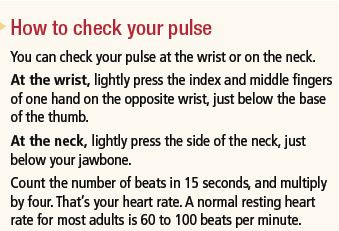How’s your heart rate and why it matters?

When it comes to your heart rate, it's a bit like the speed of your car. What you want is not too fast, not too slow, and not too erratic. In fact, most of the time, heart rhythm and pace are not things you need to think about. And unless something unusual is going on, you're likely completely unaware of what your heart is doing.
Heart rate is important because the heart's function is so important. The heart circulates oxygen and nutrient-rich blood throughout the body. When it's not working properly, just about everything is affected. Heart rate is central to this process because the function of the heart (called "cardiac output") is directly related to heart rate and stroke volume (the amount of blood pumped out with each beat).
Normal heart rate
 A normal heart rate is usually stated as 60 to 100 beats per minute. Slower than 60 is bradycardia ("slow heart"); faster than 100 is tachycardia ("fast heart"). But some experts believe that an ideal resting heart rate is closer to 50 to 70. Regardless of what is considered normal, it's important to recognize that a healthy heart rate will vary depending on the situation.
A normal heart rate is usually stated as 60 to 100 beats per minute. Slower than 60 is bradycardia ("slow heart"); faster than 100 is tachycardia ("fast heart"). But some experts believe that an ideal resting heart rate is closer to 50 to 70. Regardless of what is considered normal, it's important to recognize that a healthy heart rate will vary depending on the situation.
Here's how to determine your heart rate. First, find your pulse. The side of the neck or front of the wrist are the easiest spots. Then, count the number of beats in 30 seconds. Double this number and that's your heart rate.
In addition to calculating your heart rate, feeling your pulse can give you an idea of whether the rhythm is regular, irregular, or a mix of both.
Slow heart rate
Among healthy people, a slow heart rate may be due to:
- being physically fit
- a medication, such as propranolol or metoprolol
- sleep (though heart rate may rise during the REM stage of sleep).
On the other hand, a slow heart rate can be a sign of disease, such as:
- heart attack or other heart disease (such as "sick sinus syndrome")
- certain infections (including Lyme disease or typhoid fever)
- high levels of potassium in the blood (hyperkalemia)
- an underactive thyroid gland.
Fast heart rate
Healthy people can have a fast heart rate because they are
- exercising, especially if it's rigorous or associated with dehydration
- nervous or excited — while a heart rate over 100 might be considered "abnormal," it is entirely expected if a tiger is headed toward you
- using a stimulant, such as caffeine or cocaine
- pregnant.
Diseases associated with a fast heart rate include:
- most infections or just about any cause of fever
- heart problems, for example cardiomyopathy (in which the pumping function of the heart is reduced), atrial fibrillation, or ventricular tachycardia
- certain medications (such as an EpiPen)
- low levels of potassium in the blood (hypokalemia)
- an overactive thyroid gland or too much thyroid medication
- anemia
- asthma or other breathing trouble.
Heart rate and exercise
Exercise guidelines often suggest moderate to rigorous exercise for 20 to 30 minutes per day, but how do you know if your particular exercise qualifies? You can use your heart rate as a measure of exercise intensity.
Rigorous exercise will raise your heart rate to 70% to 80% of your maximum heart rate. What's your maximum heart rate? Just subtract your age from 220. So, for a 50-year-old person, 170 is the maximum heart rate. Multiply that number by 0.7 to 0.8 to estimate the 70% to 80% range. For this 50-year-old person, the range would be 119 to 136.
When should you worry about your heart rate?
Some people never notice the rate or rhythm of their heart, while others notice every minor irregularity (sometimes called a "skipped beat" or early beat, which happens in all of us). In the absence of symptoms (see below), that's not an indication of trouble. An abnormal rate or rhythm may be discovered during a physical exam, ECG, or other testing, even in healthy people who have no symptoms.
Common symptoms of a slow heart rate include:
- fatigue
- dizziness, lightheadedness, fainting or near-fainting
- confusion
- an inability to exercise.
Common symptoms of a fast heart rate include:
- fatigue
- dizziness, lightheadedness, fainting or near-fainting
- palpitations, or a pounding or fluttering sensation in the chest
- feeling your heart racing
- shortness of breath
- chest pain or tightness.
As you can see, some of these symptoms overlap, and many can be caused by things other than a heart rate problem. If you have questions or concerns about your heart rate, talk to your doctor. She or he can help you sort this out and recommend testing or follow-up if needed.
Image: jovanmandic/Getty Images
About the Author

Robert H. Shmerling, MD, Senior Faculty Editor, Harvard Health Publishing; Editorial Advisory Board Member, Harvard Health Publishing
Disclaimer:
As a service to our readers, Harvard Health Publishing provides access to our library of archived content. Please note the date of last review or update on all articles.
No content on this site, regardless of date, should ever be used as a substitute for direct medical advice from your doctor or other qualified clinician.















